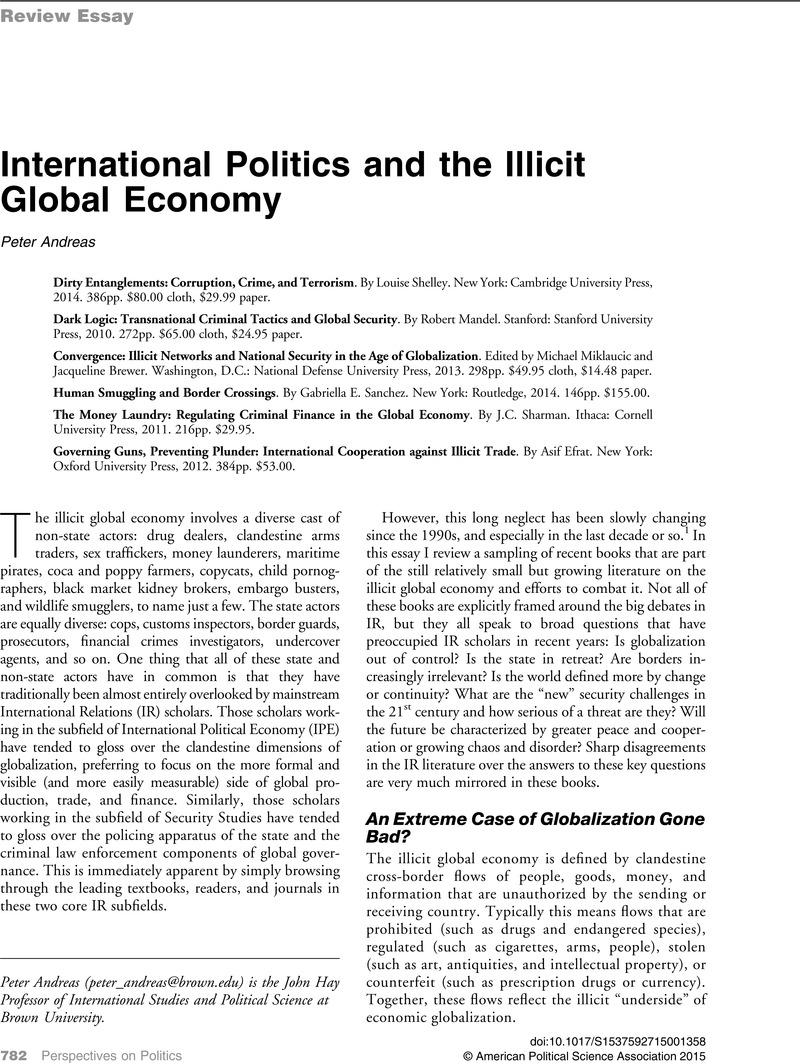Published online by Cambridge University Press: 07 September 2015

1 In addition to the books reviewed here, see, for example, Anja Jakobi, Common Goods and Evils? The Formation of Global Crime Governance (Oxford University Press, 2014); Michael Kinney, From Pablo to Osama: Trafficking and Terrorist Networks, Government Bureaucracies, and Competitive Adaptation (Penn State University Press, 2008), Peter Andreas and Ethan Nadelmann, Policing the Globe: Criminalization and Crime Control in International Relations (New York: Oxford University Press, 2006), H. Richard Friman, Crime and the Global Political Economy (Boulder: Lynne Rienner, 2009); Michael G. Findley, Daniel L. Nielson, and J.C. Sharman, Global Shell Games: Experiments in Transnational Relations, Crime, and Terrorism (Cambridge University Press, 2014), Ronen Palan, The Off-Shore World (Ithaca: Cornell University Press, 2006).
2 See, for instance, Peter Andreas and Kelly Greenhill, eds. Sex, Drugs, and Body Counts: The Politics of Numbers in Global Crime and Conflict (Cornell University Press, 2010).
3 Also see, especially, Anja Jakobi, Common Goods and Evils? The Formation of Global Crime Governance (Oxford University Press, 2014), and Peter Andreas and Ethan Nadelmann, Policing the Globe: Criminalization and Crime Control in International Relations (Oxford University Press, 2006).
4 See, for instance, Moises Naim, Illicit: How Smugglers, Traffickers, and Copycats are Hijacking the Global Economy (New York: Doubleday, 2006); and John Robb, Brave New War: The Next Stage of Terrorism and the End of Globalization (New York: Wiley, 2007).
5 See, for example, John Mueller, Overblown: How Politicians and the Terrorism Industry Inflate National Security Threats and Why We Believe Them (Free Press, 2006).
6 Vanda Felbab-Brown, Shooting Up: Counterinsurgency and the War on Drugs (Brookings Institution Press, 2009).
7 In the case of the United States, see, for example, Peter Andreas, Smuggler Nation: How Illicit Trade Made America (New York: Oxford University Press, 2013).
8 The fact that much of such behavior remains legal reflects corporate lobbying power to avoid greater regulation rather than the severity of social consequences. Nikos Passas and Neva Goodwin, eds. It’s Legal but it Ain’t Right: Harmful Social Consequences of Legal Industries (Ann Arbor: University of Michigan Press, 2005).
9 This includes the United States. See, for instance, Radley Balko, Rise of the Warrior Cop: The Militarization of America’s Police Forces (PublicAffairs, 2013), and Peter Andreas and Richard Price, “From War-fighting to Crime-fighting: Transforming the American National Security State,” International Studies Review, vol. 3, issue 3 (Fall 2001): 31–52.